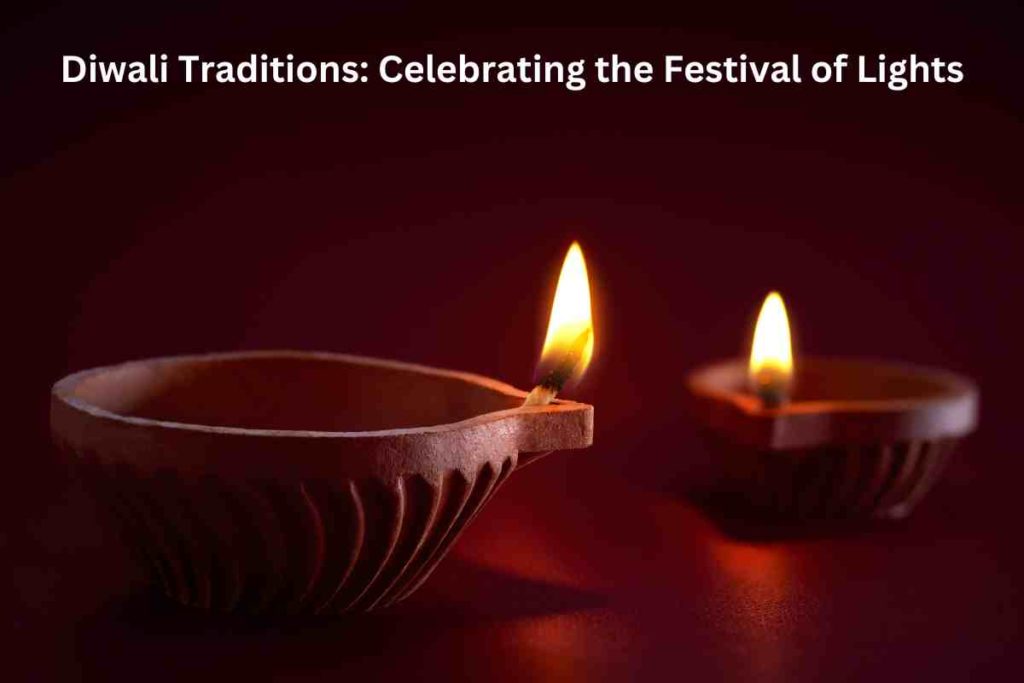Diwali Traditions: Diwali, also known as Deepavali, is a festival that holds immense cultural and spiritual significance in India and among Indian communities worldwide. This vibrant celebration, often referred to as the “Festival of Lights,” spans five days and is a time of joy, togetherness, and reflection. Let’s explore the rich traditions that make Diwali a truly unique and cherished festival.
The Festival’s Origin
Diwali’s origins are rooted in various mythological and historical events, making it a multifaceted and culturally rich festival.
The Return of Lord Rama
One of the most famous legends associated with Diwali is the return of Lord Rama to Ayodhya after his victory over the demon king Ravana. The people of Ayodhya welcomed Lord Rama by lighting rows of oil lamps, symbolizing the triumph of light over darkness and good over evil.
The Birth of Goddess Lakshmi
For some, Diwali marks the birthday of Goddess Lakshmi, the deity of wealth and prosperity. Devotees offer prayers and create beautiful rangoli designs to invite her into their homes.
Lord Krishna and Narakasura
In some parts of India, Diwali commemorates Lord Krishna’s defeat of the demon Narakasura, who symbolizes evil. People light fireworks and lamps to celebrate this victory of righteousness.
Preparations and Rituals: Diwali Traditions
The preparations for Diwali start weeks in advance and involve several customs and rituals.
Cleaning and Decorating Homes
Before Diwali, homes are thoroughly cleaned, and families decorate them with colorful rangoli patterns and vibrant lights. The aim is to create a welcoming and aesthetically pleasing environment for the deities and guests.
Lighting Oil Lamps
The lighting of oil lamps, or diyas, is central to Diwali. These lamps not only illuminate homes but also symbolize the inner light that dispels ignorance and darkness. People place diyas around their homes and in courtyards, creating a magical atmosphere.
Exchanging Gifts
Gift-giving is a cherished Diwali tradition. Families and friends exchange sweets, dry fruits, and presents as tokens of love and goodwill. This gesture reinforces bonds and fosters a sense of togetherness.
Bursting Firecrackers
The sound of firecrackers is synonymous with Diwali. While this tradition is meant to symbolize the victory of good over evil, there is a growing awareness about its environmental impact, leading to more eco-friendly celebrations.
Religious Observance: Diwali Traditions
The religious aspect of Diwali is a time for prayer, reflection, and seeking blessings.
Lakshmi Puja
On the main Diwali day, families gather for Lakshmi Puja, a special prayer dedicated to Goddess Lakshmi. They seek her blessings for wealth and prosperity in the coming year.
Govardhan Puja
In some regions, the fourth day of Diwali is observed as Govardhan Puja, celebrating Lord Krishna’s lifting of the Govardhan Hill. Devotees prepare elaborate offerings of food.
Celebrating with Sweets and Savories
Diwali is a gastronomic delight, with an array of traditional sweets and savories.
Ladoos and Barfi
Sweets like ladoos and barfi, made from ingredients like milk, ghee, and nuts, are prepared in abundance. These delectable treats are shared with family and friends.
Savory Delights
Savory snacks like samosas, pakoras, and chaklis are also an integral part of Diwali feasts. They add a delightful crunch to the celebrations.
Conclusion: Diwali Traditions
Diwali, the Festival of Lights, is a tapestry of traditions that reflect India’s diversity and cultural richness. It is a time for spiritual reflection, joyous celebrations, and acts of kindness. As diyas glow in homes, may the light of Diwali illuminate your life with happiness and prosperity.
FAQs
Question 1: When is Diwali celebrated each year?
Answer:- Diwali typically falls in October or November, depending on the Hindu lunar calendar. The exact date varies from year to year.
Question 2: What is the significance of rangoli during Diwali?
Answer:- Rangoli, colorful designs made on the ground, is believed to welcome guests and deities into homes. It is a way to enhance the festive atmosphere.
Question 3: How can one celebrate an eco-friendly Diwali?
Answer:- To celebrate an eco-friendly Diwali, opt for noiseless or low-noise firecrackers, use LED lights, and avoid single-use plastics in decorations.
Question 4: Are there regional variations in Diwali traditions?
Answer:- Yes, Diwali traditions and rituals can vary from one region of India to another. Each region has its unique customs and legends associated with the festival.
Question 5: What is the spiritual significance of lighting diyas during Diwali?
Answer:- Lighting diyas represents the inner light of knowledge that dispels ignorance and darkness. It is a symbol of spiritual awakening and enlightenment.
